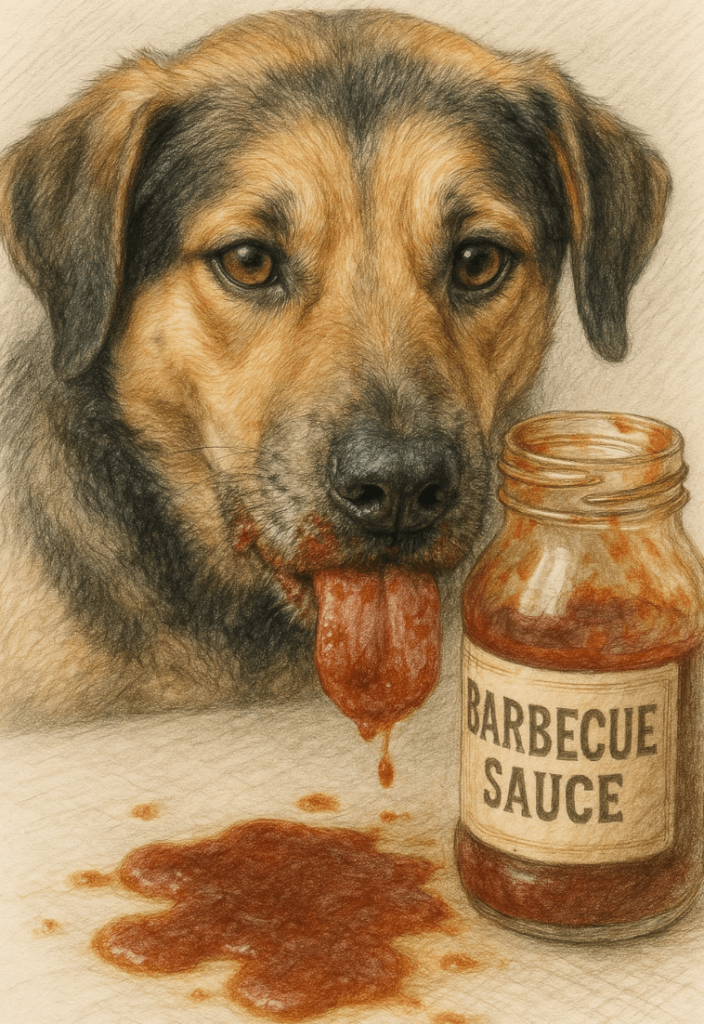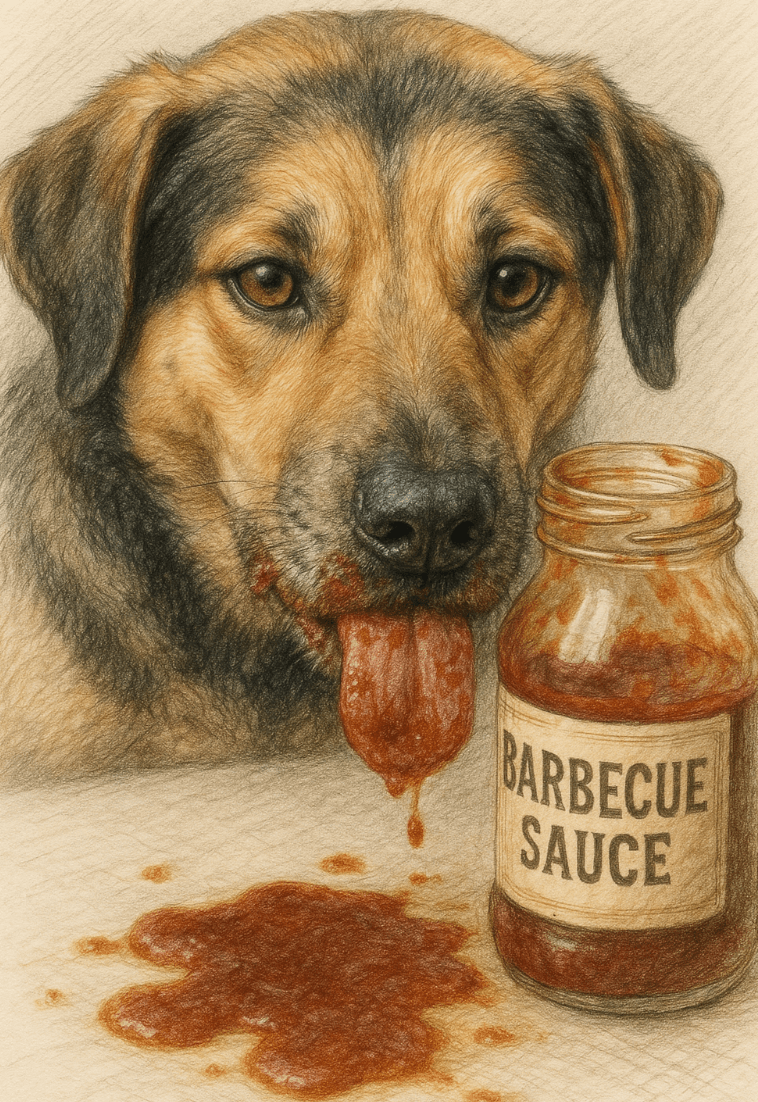Can Dogs Have Barbecue Sauce?
Barbecue sauce is a staple at cookouts and gatherings, adding a tangy, smoky flavor to grilled foods. But when your furry friend looks up at you with those big, pleading eyes while you’re slathering sauce on your ribs, you might wonder: can dogs have barbecue sauce too? While it’s tempting to share a taste of your favorite condiment, it’s important to consider what’s safe for your canine companion. Many barbecue sauces contain ingredients that could upset your dog’s stomach or even pose serious health risks. In this blog post, we’ll explore the potential dangers, safer alternatives, and expert tips to ensure your dog stays happy and healthy during barbecue season.
Potential Risks of Barbecue Sauce for Dogs
While barbecue sauce may seem harmless, many common ingredients can be problematic for dogs. Understanding these risks will help you make informed decisions about sharing food with your pet.
High Sugar Content:
Most barbecue sauces are loaded with sugar, which can lead to obesity, dental issues, and blood sugar imbalances in dogs.Onions and Garlic:
These flavor enhancers are toxic to dogs and can cause gastrointestinal upset or damage red blood cells, leading to anemia.Spices and Seasonings:
Spicy ingredients like chili powder or cayenne pepper can irritate your dog’s digestive system and cause discomfort.Artificial Additives:
Preservatives, artificial colors, and flavors found in many sauces can be hard for dogs to digest and may trigger allergic reactions.Salt Levels:
High sodium content can lead to dehydration, increased thirst, and even sodium poisoning in large amounts.
These risks highlight why it’s best to avoid giving your dog barbecue sauce altogether, especially if you’re unsure of the ingredients.
Healthier Alternatives to Barbecue Sauce for Dogs
If you want to include your dog in the barbecue fun, there are plenty of safer options that mimic the flavors they’ll enjoy without the risks.
Plain Grilled Meat:
Offer small pieces of plain, unseasoned grilled chicken or beef as a tasty treat.Homemade Dog-Friendly Sauce:
Mix unsalted broth, a touch of honey, and a dash of turmeric for a flavorful yet safe topping.Steamed Vegetables:
Serve soft, plain veggies like carrots or green beans as a healthy side dish for your pup.Fruit Treats:
Offer slices of apple (no seeds) or watermelon for a refreshing dessert option.Dog-Safe Seasonings:
Use herbs like parsley or mint sparingly to add mild flavor without harmful spices.
By choosing these alternatives, you can let your dog enjoy the barbecue experience safely and guilt-free.
Check this guide 👉Can Dogs Eat Sage? Best 7 Expert Tips!
Check this guide 👉Can Dogs Eat Wasabi? Best 7 Expert Tips!
Check this guide 👉Can Dogs Eat Mulberries? Best 7 Expert Tips!

Ingredients to Avoid in Barbecue Sauce | Dog-Friendly Substitutes |
|---|---|
Onions and garlic | Unsweetened, low-sodium broth |
Artificial sweeteners (e.g., xylitol) | Natural sweeteners like honey (in moderation) |
Spicy seasonings | Mild herbs such as parsley or thyme |
High salt content | Salt-free seasoning blends |
Preservatives and additives | Fresh, whole-food ingredients |
How to Safely Introduce New Foods to Your Dog
Introducing new foods to your dog requires caution to avoid digestive upset or adverse reactions. Follow these guidelines to ensure their safety.
Start with Small Portions:
Begin by offering a tiny amount of any new food to see how your dog reacts before giving more.Monitor for Allergic Reactions:
Watch for signs of allergies, such as itching, swelling, vomiting, or diarrhea, after introducing unfamiliar foods.Avoid Sudden Changes:
Gradually incorporate new items into their diet rather than making abrupt changes that could upset their stomach.Consult Your Veterinarian:
Always check with your vet before feeding your dog anything outside their regular diet, especially human foods.Stick to Plain Ingredients:
Keep new foods simple and free from added sugars, salts, or spices to minimize risks.
Taking these precautions ensures your dog enjoys new flavors safely and comfortably.
Signs Your Dog May Have Eaten Something Harmful
Even with careful supervision, accidents happen. Knowing the warning signs of food-related issues can help you act quickly if your dog ingests something harmful.
Vomiting or Diarrhea:
These symptoms often indicate gastrointestinal distress caused by unsafe foods or toxins.Excessive Drooling:
Drooling can signal nausea or irritation in the mouth or throat.Lethargy or Weakness:
A sudden lack of energy may suggest poisoning or an adverse reaction to certain ingredients.Difficulty Breathing:
Labored breathing could indicate an allergic reaction or ingestion of toxic substances like onions or garlic.Loss of Appetite:
Refusal to eat is a common sign that your dog is feeling unwell due to dietary indiscretion.
Recognizing these signs early allows you to seek veterinary care promptly, preventing further complications.
Common Mistakes When Feeding Dogs Human Food
Feeding dogs human food can be tricky, and mistakes are easy to make. Here are some common errors to avoid when sharing snacks with your pet.
Assuming All “Natural” Ingredients Are Safe:
Just because something is natural doesn’t mean it’s safe for dogs; examples include grapes, raisins, and onions.Overlooking Portion Sizes:
Even safe foods can cause problems if given in excessive amounts, leading to weight gain or digestive issues.Ignoring Individual Sensitivities:
Some dogs have unique allergies or intolerances, so what works for one dog may not work for another.Feeding Processed Snacks:
Chips, crackers, and other processed snacks often contain unhealthy fats, salts, and additives that harm dogs.Not Checking Labels Carefully:
Hidden ingredients like xylitol or garlic can sneak into seemingly harmless foods, posing serious risks.
Avoiding these mistakes ensures a safer and healthier snacking experience for your dog.
Tips for Hosting a Dog-Friendly Barbecue
Planning a barbecue that includes your dog? These tips will help you create a fun and safe environment for your furry guest of honor.
Set Up a Designated Dog Area:
Create a cool, shaded space where your dog can relax away from the grill and busy guests.Prepare Dog-Specific Treats:
Make sure there are plenty of dog-friendly snacks available, like plain meats, fruits, and veggies.Keep Trash Out of Reach:
Securely cover trash bins to prevent dogs from scavenging discarded bones or fatty scraps.Supervise Interactions with Guests:
Not all guests may know how to interact with dogs safely, so keep an eye on interactions to avoid accidents.Provide Fresh Water:
Ensure your dog has access to clean drinking water throughout the event to stay hydrated.
With these preparations, your dog can enjoy the barbecue just as much as everyone else.
Understanding Your Dog’s Dietary Needs
Every dog has unique dietary requirements based on factors like age, size, activity level, and health conditions. Here’s what to consider when planning their meals.
Age-Based Nutrition:
Puppies need higher protein and fat for growth, while senior dogs benefit from lower-calorie diets to maintain a healthy weight.Breed Size Considerations:
Large breeds require balanced calcium and phosphorus levels, while small breeds may need smaller kibble sizes for easier chewing.Activity Level Adjustments:
Active dogs require more calories and nutrients, whereas sedentary dogs thrive on portion control to prevent obesity.Special Health Conditions:
Dogs with allergies, diabetes, or kidney issues may need specialized diets tailored to their needs.Regular Veterinary Check-Ups:
Routine exams help identify dietary adjustments needed to support your dog’s overall health and well-being.
Understanding these factors ensures your dog receives the nutrition they need to live a long, healthy life.
Frequently Asked Questions About Dogs and Barbecue Sauce
Can dogs eat barbecue chicken wings?
No, the bones and sauce pose choking hazards and contain harmful ingredients. Stick to plain, boneless chicken instead.
Is store-bought barbecue sauce safe for dogs?
Most store-bought sauces are not safe due to high sugar, salt, and spice levels. Always read labels carefully.
What should I do if my dog eats barbecue sauce?
Monitor them closely for symptoms of illness. If they show signs of distress, contact your veterinarian immediately.
Are homemade barbecue sauces safer for dogs?
Yes, if made with dog-safe ingredients like broth and mild herbs, homemade versions can be a safer option.
Can puppies have barbecue sauce?
Puppies have sensitive digestive systems, so it’s best to avoid giving them barbecue sauce entirely.
Prioritizing Your Dog’s Health During Barbecue Season
Barbecue sauce might be a delicious addition to our meals, but it’s not suitable for our four-legged friends. By understanding the risks and opting for safer alternatives, you can ensure your dog enjoys the festivities without compromising their health. Whether it’s offering plain grilled meat or whipping up a dog-friendly sauce, there are plenty of ways to include your pup in the fun responsibly. Remember, your dog relies on you to make the best dietary choices for them—so always prioritize their well-being above all else.
Do Cats Have Taste Buds? Best 7 Expert Tips! – Discover how cats experience flavors and why their taste is so unique.
Do Dogs Have Taste Buds? Best 7 Expert Tips! – Discover how dogs experience taste, their preferences, and what it means for their diet and health.
Can Cats Taste Sweet? Best 7 Expert Tips! – Discover why cats can’t taste sweetness, how it affects their diet, and tips to keep them healthy and happy.
Can Dogs Taste Sweet? Best 7 Expert Tips! – Discover how dogs perceive sweetness, which foods are safe, and tips to manage their sweet cravings responsibly.





